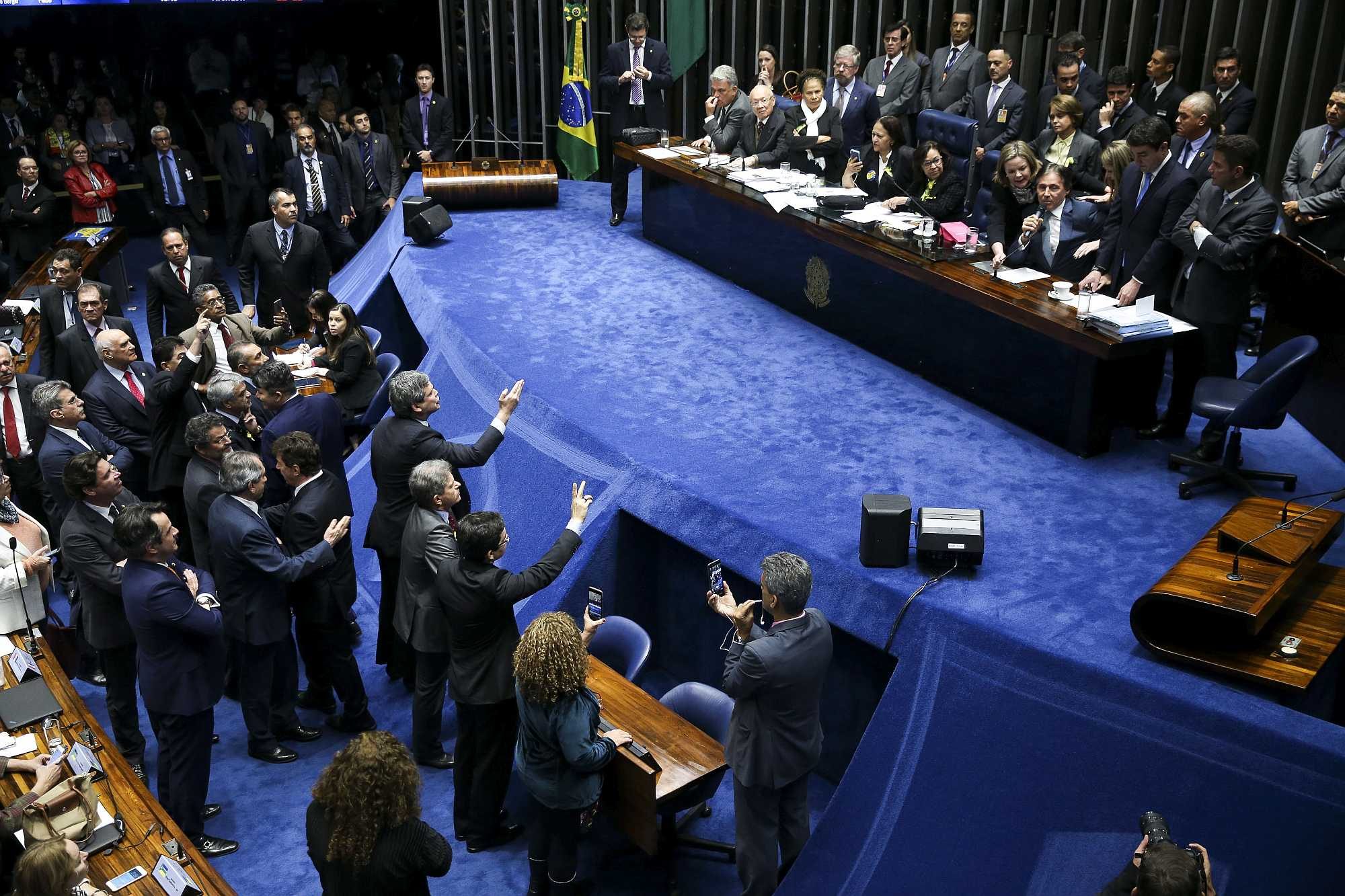Brazil’s Senate has passed an overhaul of Brazil’s labor laws, aimed to kickstart an ailing economy. But political pressure on President Michel Temer may prevent him from staying in office to see the reforms executed.
The bill – which includes a cap on government spending, an overhaul of the pension system and an easing of worker protections – is part of an economic reform program that President Temer has said is needed to reinvigorate the economy.
The reforms also include extending the minimum retirement age for men to 65 and for women to 62 from the low 50s at present.
Opposition senators attempted to block the vote (pictured above), but the vote on the measure’s first reading saw it passed 50-26 late on Tuesday.
As the Brazilian economy remains in recession, supply side economic reforms – focused mainly on freeing up the labor market – have acquired increased traction among a domestic business elite tired of political inertia and corruption as well as among international investors, who want a return to an era of prosperity in South America’s most populous country.
The bill’s reforms have also alienated the left and trade unions.
With a budget deficit of 9.2 percent of GDP and a creaking pension system, Brazil is suffering its worst recession in history, with unemployment persistently high.
Temer’s Day Numbered?
The labor overhaul could give President Temer a boost before the Chamber of Deputies votes on whether to suspend him from office and put him on trial for corruption. That vote has yet to be scheduled.
Temer – who took power in 2016 after Dilma Rousseff was impeached and removed as president – was charged in June in connection with a graft scheme involving JBS SA, the world’s biggest meatpacker.
Prosecutor General Rodrigo Janot alleged that Temer made deals in which JBS would have paid him 38 million reais (US$ 11.5 million).
Janot has said he will likely charge Temer in the coming weeks with racketeering and obstruction of justice.
Temer has denied any wrongdoing in the matter.
Unpopular Law
The approval of an unpopular overhaul of the country’s labor laws provides crucial political support to embattled President Michel Temer as he fights a damaging corruption accusation.
Opposition senators had tried to block the vote with a sit-in at the Senate president’s rostrum, but the session resumed after a six-hour delay and in a vote on the measure’s initial reading the body voted 50-26 in favor.
After several hours of debate, the Senate then rejected any changes to the legislation, which already passed the lower house of Congress, and the measure went to the president for his signature.
“This is a Victory for Brazil in the fight against unemployment and in the construction of a more productive economy,” said a celebratory tweet from Temer, who proposed the work rule changes.
The measure is part of a program being pushed by Temer that he says is needed to bolster Brazil’s economy, which is in a deep slump.
The legislation calls for agreements negotiated between employers and workers on a range of issues to override current labor law, and it also will make it easier for businesses to hire temporary workers, even for extended periods of time.
Other legislation being pushed by Temer would cap government spending and make the pension system less costly.
Although most senators backed the labor law bill, the president’s allies did not take the opportunity during the session to speak in favor of the overhaul, which opinion polls indicate is widely unpopular with Brazilians.
“The Brazilian people know that this reform will not bring jobs,” said Humberto Costa, leader of the opposition Worker’s Party.
Early in the day, opposition senators had commandeered the leaders’ table on the rostrum and prevented Senate President Eunicio Oliveira and some of his allies from taking their seats.
Oliveira responded by ordering the power and microphones cut off and he adjourned the session, leading to long negotiations behind the scenes while the insurgents remained in the chamber. After six hours, Oliveira took a seat at a smaller chair and restarted the session while having to shout to fellow senators, and the rebels soon gave up the sit-in.
The spectacle underscored how acrimonious Brazilian politics have become in recent months as Temer’s popularity has plummeted and a corruption charge against him has emboldened members of the opposition who believe he never should have become president. Temer took power last year after his predecessor, Dilma Rousseff, was impeached and removed as president.
Allies of the president hope the victory on the labor law bill will give the president a boost before Congress lower house, the Chamber of Deputies, votes on whether to suspend him from office and put him on trial for corruption. That vote is not yet scheduled.
If two-thirds of deputies should vote against Temer, lower house Speaker Rodrigo Maia would take over presidential duties while Brazil’s Supreme Court decided whether to remove the president or find him not guilty.
DW/Mercopress

